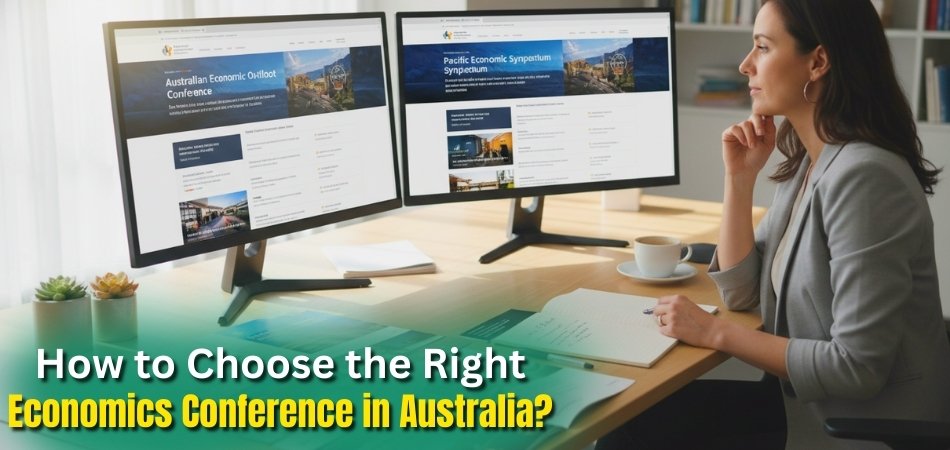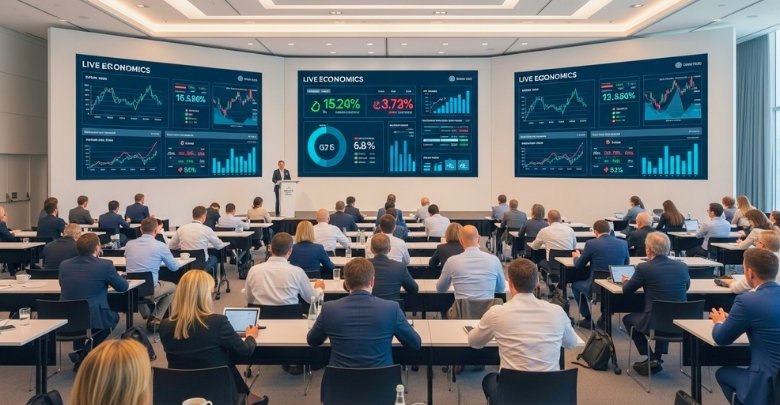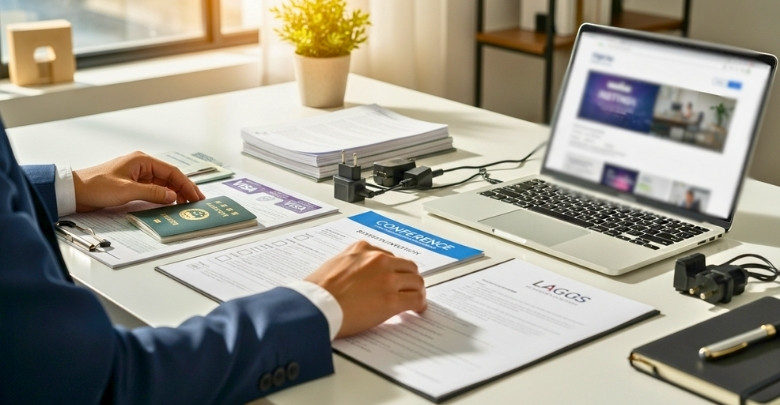Attending economics conferences in Australia is a great way to learn from experts, share ideas, and grow your network. These events bring together academics, researchers, and professionals who explore pressing topics like trade, finance, and sustainable development. Choosing the right one can improve your learning experience and career growth.
If you’re wondering how to choose the right economics conference in Australia, start by selecting one that matches your interest area, such as trade or agriculture. Check speaker profiles, event schedules, and locations, and consider cost, travel, or online options. Also, review past feedback and look for student discounts.
Keep reading to discover smart tips and proven strategies that will help you select the perfect conference for your goals.
How to Choose the Right Economics Conference in Australia?
Economics conferences help students and professionals learn, network, and grow. Choosing the best event takes careful thinking. You must plan early, know your goals, and check important details. These are the steps that help you choose the right one and gain a valuable learning experience that supports your career and research success.
Step 1: Identify Your Purpose for Attending
Every person has a reason for attending a conference. Some want to present new research, while others aim to network. Clarifying your goal helps you find events that suit your stage of learning. Think about what outcome you expect, like building contacts, publishing work, or gaining exposure to global ideas.
Step 2: Know the Types of Economics Conferences in Australia
Different conferences serve different needs. Academic ones focus on sharing research, while policy events link economics with governance. Professional meetings target industry learning and development. There are also student-friendly options. Exploring available conferences in Australia helps you decide which setting fits your goals and learning interests best.
Step 3: Evaluate the Conference’s Credibility
Look for trusted organizers before you register. Reliable conferences often come from universities or recognized associations. They have peer-reviewed papers and clear schedules. Check past events, speaker lists, and previous feedback. If details are missing or unclear, stay cautious. Attending credible events ensures you gain true knowledge and recognition.
Step 4: Match the Conference Theme With Your Interests
Each conference has a main focus. Make sure the topics match your area of study or work. Read the “Call for Papers” to check if your ideas fit. Choosing a conference with the right theme helps you share insights effectively and engage in discussions that matter to your expertise.
Step 5: Consider Location, Cost, and Accessibility
Practical details influence your choice more than you think. Consider travel distance, city options, and visa requirements early. Compare costs such as registration fees and accommodation. Some events offer student discounts or virtual access. Managing these factors ensures your participation stays comfortable and within your planned academic budget.
Step 6: Networking and Career Development Opportunities
A great conference offers more than presentations. Look for workshops, mentorship sessions, and discussion panels. These activities expand your professional connections. Engaging with experts builds confidence and opens new opportunities. Networking also allows you to stay updated on current trends that shape the world of economics today.
Step 7: Create a Personal Conference Selection Checklist
Prepare a checklist before finalizing your choice. Include points like credibility, topic match, cost, and travel comfort. Reviewing this list saves time and prevents confusion. Checking each point ensures your chosen conference aligns with your purpose. A clear plan helps you make confident and smart participation decisions every time.
Common Goals for Different Attendees
People join economics conferences for unique reasons that fit their goals and learning needs. Some want to share their ideas, while others come to connect with experts. Understanding these goals helps attendees choose the right sessions and prepare better. These goals add purpose and make the experience more meaningful overall.
- Research Presentation: Presenting research helps participants gain recognition for their work. It allows them to receive feedback, improve ideas, and connect with similar thinkers.
- Skill Development: Workshops and sessions teach new tools for data study and policy design. Attendees learn practical methods that strengthen both academic and professional abilities.
- Networking Growth: Meeting peers and experts opens many doors for collaboration. Attendees exchange ideas, discuss shared interests, and build meaningful professional relationships easily.
- Career Exposure: Joining conferences introduces new job or internship chances. Many attendees meet recruiters or mentors who guide them toward professional progress successfully.
- Knowledge Expansion: Listening to leading economists improves understanding of current global issues. Participants explore diverse viewpoints, deepening their grasp of economic systems and solutions.
- Publication Opportunities: Publishing accepted papers boosts credibility and confidence. Authors often gain more visibility within the academic field and attract future research partnerships.
- Learning Innovation: Exposure to new topics and digital tools inspires creativity. Attendees discover emerging technologies and approaches that improve how they study economics.
Knowing your reason for attending ensures a purposeful and valuable conference journey. By focusing on clear goals, you direct your energy toward meaningful outcomes. Attending and engaging in sessions aimed at improving critical thinking through economics conferences helps sharpen your analytical skills, build strong professional links, and support continuous personal and academic growth.
Major Annual Economics Conferences in Australia
The study of economics helps us understand how countries manage their money, trade, and growth. Australia hosts a number of conferences each year to discuss new business and economic ideas. We’ve compiled a list of the top 10 Australian economics conferences you need to attend.
- 113th Global Conference on Business Management and Economics | November 15, 2025, Sydney, Australia
- World Conference on Accountants | November 3, 2025, Sydney, Australia
- 69th Global Conference on African Economy and Culture | November 15, 2025, Sydney, Australia
- CESA Annual Conference (Chinese Economics Society Australia) | December 1, 2025, Melbourne, Australia
- International Conference on Economics and Human Resource Management | December 5, 2025, Sydney, Australia
- Inaugural AE² Conference (Australian & NZ Association of Econometricians) | December 8–10, 2025, Macquarie University, Australia
- AARES 2026 (Australasian Agricultural & Resource Economics Society) | February 11–13, 2026, Adelaide Convention Centre, Adelaide, Australia
- Asia-Pacific Meeting of the Economic Science Association (APESA) 2026 | April 9–12, 2026, University of Melbourne, Australia
- International Conference on Law and Economics | May 8–9, 2026, Australia
- American Association of Wine Economists (AAWE) Annual Conference 2026 | July 8–13, 2026, University of Western Australia, Perth, Australia
What to Watch Out For While Choosing a Conference?
Picking a good conference sounds simple, but it can sometimes be tricky. Some events look real but are not worth your time. Many students end up wasting money on fake ones. It’s important to know what signs show a conference is not genuine. Here are the things you should pay close attention to before deciding.
Unclear Organizers
If a conference website doesn’t clearly show who is running the event, that’s a big warning sign. Real conferences usually mention their host university, research group, or professional organization. Fake ones often hide this information or use random names. Always check for contact details and look for real people behind the event before you sign up.
Generic Emails
Watch out for strange emails inviting you to present your research. Real organizers don’t send random invitations to everyone. Fake conferences often use general greetings like “Dear Researcher” or “Dear Participant.” They don’t mention your name or topic. If an email feels too broad or pushy, it’s safer to ignore it.
No Review Process
Real academic events have a review system where experts check papers before accepting them. Fake ones skip this step and accept anything just to get fees. If a conference promises instant acceptance or doesn’t ask for a proper paper, that’s suspicious. Always make sure there’s a real review process before you apply.
Fake Indexing Claims
Some bad conferences claim their papers are published in famous databases like Scopus or Web of Science. They do this to look professional. You can visit those official sites and check if the conference is really listed there. Never trust a website that gives false indexing details without proof.
Poor Website Design
A fake conference website often looks messy, with spelling mistakes and missing pages. Real ones look organized, with clear dates, schedules, and contact information. If you see strange logos or broken links, it’s best to stay away. A trustworthy event always presents clear and well-made information online.
Unrealistic Promises
Be careful of big claims like “Guaranteed publication” or “Instant certificate.” Genuine conferences never make such promises. They focus on learning and sharing ideas, not selling easy results. When something sounds too good to be true, it usually is. Always check reviews before spending your money.
No Past Records
Good conferences happen regularly and leave records of past events, photos, or speaker lists. Fake ones disappear after one year or change names. Try searching online for older editions or reviews. If you find nothing, that’s a reason to doubt it. Reliable events always have a clear history.
Tips for International Attendees (Especially from Asia or Nearby Regions)
Traveling to another country for a conference can feel exciting and a little confusing at the same time. Planning well helps you avoid stress and enjoy the experience more. These helpful tips make your trip smoother, safer, and more enjoyable from start to finish.
Check Travel Documents
- Make sure your passport has at least six months of validity left before you travel. Updating early avoids last-minute problems and stress later.
- Apply for the right visa type, depending on your conference category. Reading the instructions carefully helps you save time and avoid rejection.
Plan Early Bookings
- Flight and hotel costs increase as the event date gets close. Booking early saves money and gives you better choices.
- Look for accommodations near the conference venue. Staying close helps you reach sessions easily and saves daily travel time effectively.
Manage Your Budget
- Estimate how much you’ll need for travel, food, registration, and emergencies. Keeping a clear budget prevents overspending during your trip.
- Some universities or sponsors offer student grants. Checking these options early might help cover fees and reduce your travel costs.
Stay Aware of Local Culture
- Every country has its unique manners and customs. Learning a few greetings or polite gestures shows respect and builds friendly communication.
- Dress codes and behavior expectations vary by location. Understanding local habits helps you blend in comfortably during meetings and events.
Prepare for Presentations
- Practice your presentation well before you leave home. Speaking clearly with confidence makes your session more engaging for the audience.
- Pack all necessary materials like slides and backups. Having digital and printed copies saves you if technical issues suddenly appear.
Understand Conference Procedures
- Read the official website carefully for details about registration and schedule. Following all steps to attend an economics conference helps you avoid confusion later.
- Many conferences have apps or online portals for updates. Checking them daily keeps you informed about session times and venues.
Stay Connected Safely
- Buy a local SIM card or portable Wi-Fi plan. Staying connected helps you use maps and contact organizers easily.
- Keep important phone numbers saved offline. Internet issues happen, so having backup contact options ensures you stay reachable anytime.
Handle Jet Lag and Health
- Try adjusting your sleep schedule a few days before flying. Doing this helps your body adapt faster to new time zones.
- Drink plenty of water and eat light meals during travel. Avoiding heavy food makes you feel fresher when you arrive.
FAQs About Choosing a Suitable Economics Conference in Australia
Attending an economics conference can open doors to new learning and networking opportunities. Still, many students and professionals have small doubts before registering. These common questions and answers will help you make smarter and more confident decisions.
How Early Should I Start Looking for a Conference?
Begin searching at least four to six months before the event. Early planning gives you time to prepare papers, apply for funding, and secure cheaper flights and accommodations. It also allows you to understand conference themes and submission deadlines properly.
Can I Attend Without Presenting a Paper?
Yes, you can attend without presenting. Many conferences welcome participants who come to listen, learn, and network. Observing other researchers and sessions helps you understand academic standards, new ideas, and presentation styles that might inspire your future research topics.
Are Virtual Conferences Worth Attending?
Virtual conferences can be a great option if travel costs are high. They offer similar learning opportunities through online sessions and workshops. While you might miss in-person networking, you still connect with experts and access valuable discussions from your own space.
What Should I Carry for a Conference Trip?
Pack your research materials, laptop, notebook, and printed schedule. Keep travel essentials like adapters, chargers, and formal clothes ready. Carry business cards for networking and a folder to store notes or contacts collected during the sessions for future communication.
How Can I Find Funding to Attend a Conference?
Many universities and research groups provide travel grants for students and early researchers. You can also check conference websites for scholarships or fee discounts. Applying early and preparing a strong purpose statement increases your chances of getting selected for support.
Bottom Lines
Joining a good economics conference can really help you learn new things and meet helpful people. Picking the right one takes a bit of care and planning. When you know how to choose the right economics conference in Australia, it becomes much easier to find a useful event.
Always check who is hosting it, what topics it covers, and how much it costs. Look for real reviews and trusted names before you register. A well-planned choice will help you learn, make friends, and grow in your studies or career without wasting time or money.








